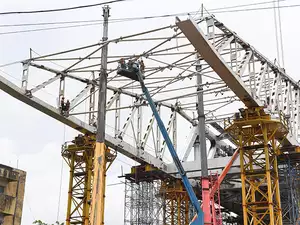Steel demand to grow led by govt spending on infrastructure

Domestic steel demand is tipped to grow in the near term on the back of strong demand led by government spending on infrastructure. The demand boost is set to partially offset cost pressures that domestic companies are likely to face in the near to medium term, ratings agency ICRABSE -1.67 % Limited has said in its latest quarterly update on the steel sector.
ICRA said operating profitability of the steel industry, which comprised a sample of 22 large and mid-sized steel players, accounting for about 60% of the current domestic capacity, improved to 16% in Q2FY2018 from 12.5% in Q1FY2018 because of reduced coking coal costs and higher steel prices. Despite cost pressures, margins are expected to remain sequentially similar in Q3FY2018 because of a likely pick-up in demand.
“Given the seasonally stronger demand in H2FY2018 and the Government’s push on infrastructure spending, the domestic steel demand growth is expected to improve further in the near term. Production growth too is expected to revive on the back of a likely pickup in domestic demand and favourable international steel prices, enabling an export push.” Jayanta Roy, senior vice president, ICRA said. Backed by healthy consumption growth rates of 6% in October 2017, domestic steel demand growth was marginally higher at 4.5% in first seven months of FY2018 compared to 4.4% in first four months of FY2018, the report said.
On the raw material side, ICRA said it expects seaborne iron ore prices to remain weak in H2FY2018, largely dragged down by scheduled Chinese steel production cuts during the winter months, as well as a piling up of iron ore inventories at Chinese ports. Taking a cue from the weakness in international prices, state-run miner NMDC Limited reduced the price of iron ore fines and lumps in India by Rs 100/tonne in October 2017.
Nonetheless, considering a lead time of two months for import shipments to arrive in India, average coking coal prices are sequentially up by close to US$ 30/tonne in Q3FY2018 so far, which would lead to cost pressures of around US$ 25/tonne for blast furnace players, the report added.
